Human Rights Group Condemns Execution Of Dozen Men In Iran
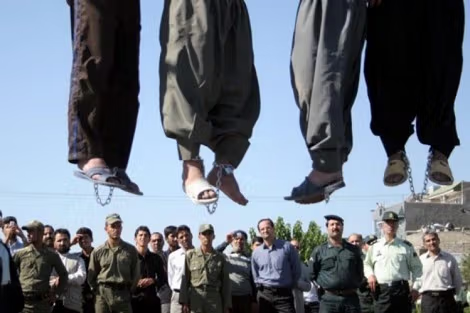
A Norway-based Iran Human Rights Organization has called on the international community to react to the group execution that has taken place in Iran.

A Norway-based Iran Human Rights Organization has called on the international community to react to the group execution that has taken place in Iran.
Iran Human Rights (IHRNGO) said in a report on Thursday that at least ten men have been put to death in Karaj, a city near the capital Tehran. The men appear to have been sentenced on drug related charges and were executed in Ghezel Hesar Prison in one day, according to the rights group.
Mahmood Amiry-Moghaddam, the Director of the NGO, said that these are preliminary information, and the number of executions may be higher than ten. Amiri-Moghaddam mentioned that authorities in Iran are carrying out more executions and acts of violence while all international eyes are on the Hamas-Israel war.
“The Islamic Republic is taking advantage of media attention on Gaza to execute more people.”
“For the Islamic Republic, any war is a blessing,” Amiri-Moghaddam said in a post.
Earlier in October, on the occasion of World Against Death Penalty Day, IHR NGO released a report on the condition of drug related executions in Iran. Since 2010, the government has killed 3,990 people in the name of “war on drugs” according to the recent report.
Strongly condemning the group executions in Iran, IHRNGO has called on the international not to turn a blind eye on the matter.
“The United Nations Office on Drugs and Crime (UNODC) which collaborates with the Islamic Republic on combating drug trafficking, has an obligation to take action against arbitrary drug executions.”
The UN’s silence on these executions is a green light of approval,” said Amiry-Moghadam.
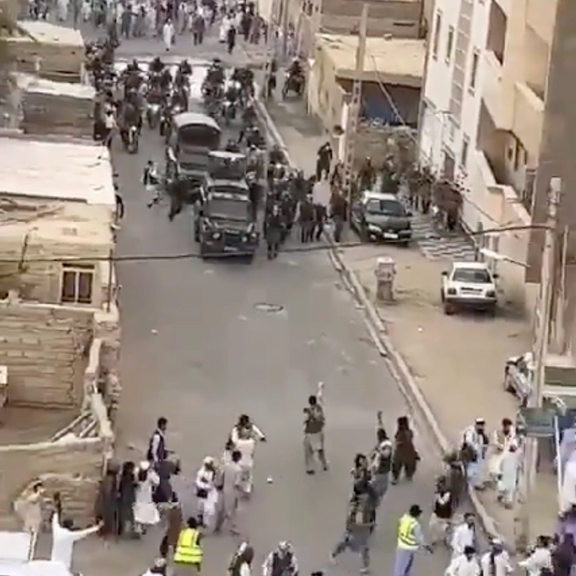
Iranian security forces attacked people in the Sunni-majority city of Zahedan in the southeast, and arrested many who wanted to hold rallies after Friday prayers.
Since Friday morning, security was tense around the Makki Jameh Mosque of Zahedan, where outspoken Sunni leader Mowlavi Abdolhamid weekly delivers fiery sermons criticizing the Islamic Republic and its policies. The people of the Sistan-Baluchestan, with Zahedan as provincial capital, have been holding weekly protests after security forces opened fire at peaceful protesters, killing nearly 100 on September 30, 2022, a day known as the Bloody Friday of Zahedan.
Abdolhamid has repeatedly called for an end to repression in the past one year and respect for civic and human rights in Iran.
The heavy security atmosphere on Ocotber 20 can be related to a wave of crackdown against the Sunni community, particularly dissident Sunni clerics and their close circles, including arrests and travel bans, especially since the Israel-Hamas conflict began earlier in the month.
HaalVsh, a website dedicated to human rights and events in Sistan-Baluchestan, reported violent arrests and mass detention of people around the Makki Mosque. “Security and military forces have surrounded the mosque and are attempting to enter,” it said.
Citing local sources, HaalVsh said security forces are transferring detained people with military as well as personal vehicles, while some of these people have been injured during the clashes with the forces.
In the footage from the protests, gunshots are heard, and security forces use teargas to control the crowd. In one of the videos, a group of regime forces, military vehicles and motorbikes are seen moving in a street as protesters surround them from both ends of the street.
In another video, people are heard chanting “Not Gaza, Not Lebanon, I will die for Iran,” a common slogan in rallies against the Islamic Republic, which is the main sponsor of regional Islamist militias such as Hamas, which instigated the bloody war in the Middle East earlier in October.
During the Friday prayer sermons, Mowlavi Abdolhamid, who rejected the regime’s goal of destroying Israel the previous Friday, reiterated his call for a fair global solution to the conflict. The Israel-Hamas war has reached a "dangerous point," he said, adding that "The war in Gaza must come to an end, and the prisoners and hostages must be set free." His stance on the conflict, calling for peace between Palestinians and Israel, may be one of the reasons for the regime’s intensified crackdown on Sunnis in Iran.
He also called on the international community to probe into this week's explosion at a Gaza hospital, which caused a media frenzy around the world. Israel has provided mountains of evidence to prove that it did not target the hospital, but Hamas says Israel has killed hundreds of Gazans in an 80-bed hospital.
Given the conflicting narratives of the two parties over the explosion at the Al-Ahli Hospital in Gaza, “the international community should impartially investigate this matter to ascertain the truth,” Abdolhamid said.
Elsewhere in his sermon, Abdolhamid criticized the regime for pressures on the Sunni community, particularly mentioning two Sunni clerics who were prohibited from travelling to Zahedan to meet him. Abdolhamid also slammed the regime for closing down a Sunni prayer house in the capital Tehran. Iranian Sunnis have always faced difficulties in establishing mosques or holding gatherings in large cities, especially the capital and its suburbs.
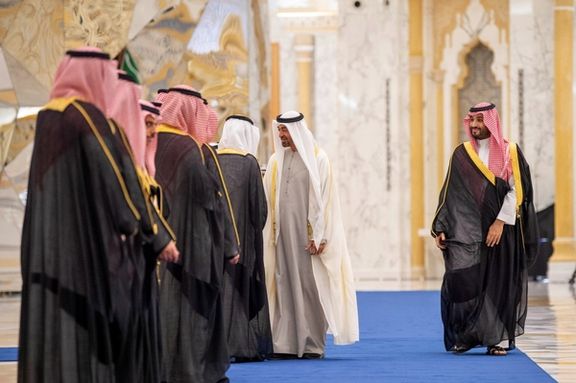
The Saudi crown prince and president of the United Arab Emirates met on Friday as the two states worked to overcome their differences amid risks of conflict engulfing the Middle East.
Saudi state news agency SPA showed footage of Crown Prince Mohammed bin Salman, the kingdom's de facto ruler, receiving UAE President Mohammed bin Zayed Al Nahyan at Riyadh's airport.
Persian Gulf states worry Iran could be drawn into a conflict that would affect their national security and have been pressing Western allies and Israel to de-escalate tensions in Gaza and lift a siege on the strip. It appears more likely that Israel may soon launch a ground offensive in Gaza, as rhetoric from Iran remains high.
Public meetings between the crown prince and Sheikh Mohammed have been rare in recent years as the close allies competed for investment and regional influence.
Sheikh Mohammed attended a summit between the Gulf Cooperation Council (GCC) and the Association of Southeast Asian Nations (ASEAN) in Riyadh on Friday, Saudi and UAE state media said.
GCC and ASEAN countries called for a durable ceasefire, the immediate release of civilian hostages and detainees, and a two-state solution for the Israeli-Palestinian conflict, a joint statement, published after the summit, said.
Last year, Prince Mohammed and Sheikh Mohammed met when Prince Mohammed visited Abu Dhabi to offer his condolences on the death of Sheikh Khalifa, the UAE's previous president. Sheikh Mohammed also visited Jeddah last year, and the two leaders met on the sidelines of the G20 summit in November.
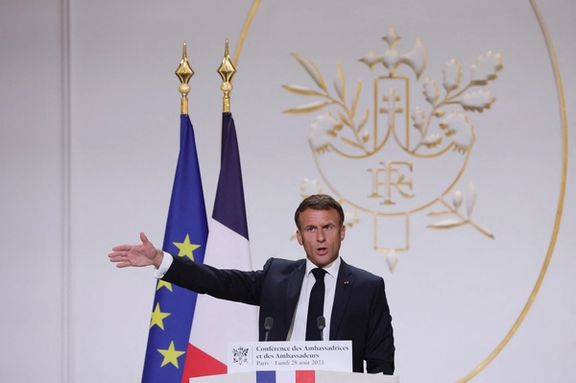
Emmanuel Macron, the President of France sent a message in support of Iranian women and their fight for freedom against the Islamic Republic of Iran.
On Thursday, Macron posted on Twitter now X about this year’s Sakharov Prize being awarded to Mahsa Amini and the Women Life Freedom Movement in Iran.
“The Sakharov Prize is a powerful reminder of Europe's commitment to freedom.”
“It goes today to Mahsa Amini and to all Iranian women who are courageously fighting for their rights,” said Macron.
The Sakharov Prize is awarded each year by the European Parliament to honor individuals and organizations that defend human rights and basic freedoms. This year, the prestigious prize was given to Mahsa Amini and the Women Life Freedom Movement.
In 2022, the death of Mahsa Amini, the 22-year-old Kurdish-Iranian woman while in police custody for improper attire, sparked one of the most widespread anti-government protests across the country. The crackdown on protests resulted in hundreds of deaths and thousands of arrests by authorities, according to human rights organizations.
European Parliament President Roberta Metsola announced the 2023 laureate in the Strasbourg plenary chamber on Thursday with the award ceremony due to take place this December.
“We stand with those who, even from prison, continue to keep Women, Life and Freedom alive,” said Metsola referring to Narges Mohammadi, jailed activist who won the 2023 Nobel Peace Prize in early October.
“By choosing them as laureates for the Sakharov Prize for Freedom of Thought 2023, this House remembers their struggle and continues to honour all those who have paid the ultimate price for liberty,”
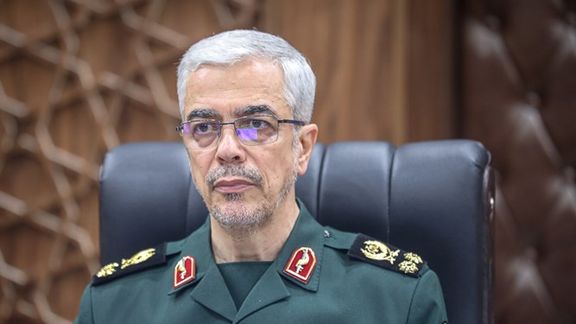
The Iranian Armed Forces have been calling on regional countries and allies to prevent the United States from sending weapons to Israel amid its war with Hamas.
Mohammad Bagheri, the chief of staff of Iran’s armed forces spoke to his counterparts in Qatar, Russia and Turkey this week urging them not to allow the US to use its bases in the Middle East for the transfer of arms to Israel, media in Tehran reported.
In his call with the Qatari defence minister, Bagheri asked for Doha to deny the US the use of its Al-Udeid airbase, a request which is under consideration, according to a post by The Crisis Watch.
Iran has been supporting Hamas with funds and weapons and it has repeatedly voiced its determination to destroy Israel.
Al Udeid Air Base is a military base located close to Qatar’s capital Doha and is home to headquarters of United States Central Command (USCC) and United State Air Force Central Command (USAFCC).
In 2019, the US and Qatar signed an agreement reaffirming Qatar’s commitment to supporting US military activities at the Al Udeid Air Base.
Qatar has a good relationship with the Islamic Republic and the United States and often acts as mediator between the two advisories.
Qatar facilitated the US-Iran prisoner swap in September which released $6 billion of blocked funds to the Iranian regime.
Bagheri also spoke to Turkish and Russian defense ministers warning about US arms supply to Israel and the possibility of other countries joining the war if attacks on the Gaza Strip continues.
“Sending weapons and arms will complicate things,” he said with regards to US support for Israel.
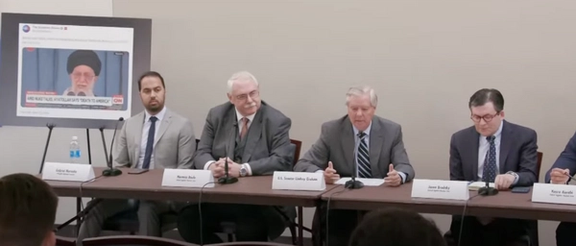
Amid Israel’s war against Iran-backed Hamas, US Senator Lindsey Graham hosted a panel of Iran experts to discuss how the US must take a firm posture to deter Iran.
Moderated by United Against Nuclear Iran (UANI) CEO Ambassador Mark D. Wallace, the Wednesday “Roundtable on Correcting US Policy Toward Iran” included several fellow analysts at the UANI and former US State Department advisor on Iran Gabriel Noronha.
The participants in the panel were all critics of the Biden administration's foreign policy and particularly its Iran policy.
Senator Graham (R-SC), who this week called for a joint military operation against Iran, blames the Iranian regime for Hamas' attack against Israel October 7 that can potentially lead to a multi-front full-fledged war in the Middle East.
Pointing to the Biden administration's official reaction to the attack claiming there is no evidence proving Tehran’s direct involvement, Graham quipped, “If you believe the Ayatollah in Iran woke up one day and read about this attack in the paper or saw it on TV, you're crazy!” He argued that Washington does not want to confirm Iran’s role because then it will be urged to act about it.
Referring to about 30 US citizens killed in the Hamas attack, which Iran has been celebrating since day one and glorifying as a victory for its so-called ‘axis of resistance,' Graham said the US should make Iran feel that there are consequences for the actions of its proxy militants across the region.
‘Axis of Resistance’ is a term coined by the Islamic Republic to refer to its proxy forces in the region including, Palestinian militant groups, the Syrian regime, the Lebanese militant group Hezbollah and other factions.
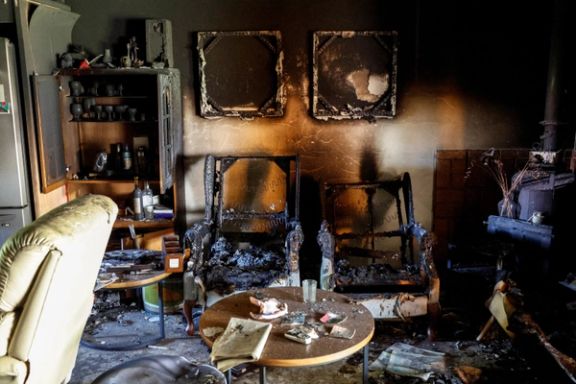
Referring to Jordan, Egypt and Palestinian Authority canceling their meeting with President Joe Biden this week, based on an exaggerated report about an explosion at a Gaza hospital, the Senator argued that US allies should also know there will be consequences for their behavior.
Referring to the possibility of Hezbollah and other Tehran-backed US-designated terror groups joining the conflict, he said that if this war expands, the US should start military action against Tehran. “If there was a war with Iran, we would win," he stated.
Graham urged the United States to stop the Islamic Republic, which seeks to destroy the Jewish state and has been very vocal about it; “Israel cannot afford two holocausts.”
He also said that the timing of the attack – often called on media as “the September 11 of the Middle East”-- is directly related to the news about the normalization of relations between Israel and Saudi Arabia, which Iran was warning against since other Arab countries did so in the Abraham accord. “This attack was so vicious and so cruel that it had a purpose: to make it so gruesome that Israel could not look away and has to go in on the ground, and the belief is that will stop the reconciliation process,” he said.
Emphasizing the threat posed by Iran in case it builds nuclear bombs, Garaham said North Korea, Russia or China have nukes, but they would not attack the US preemptively because they are not “religious zealots.” “The Iranians are motivated by religion. They want chaos to bring back the missing Imam. They want the end of times to unfold in in their lifetime so if they had a nuclear weapon, I am 100% confident they would use it as part of their religious crusade.”
The Biden administration chose to engage in indirect negotiations with Iran upon assuming office in early 2021 to revive the JCPOA nuclear accord abandoned by Donald Trump, but the talks failed and Iran in the meantime expanded its nuclear program. According to the UN nuclear watchdog the IAEA, Iran now has enough enriched uranium for up to 5 nuclear warheads.
Panelist Norman Roule, who served for 34 years in the Central Intelligence Agency (CIA) managing various Middle East programs, started with enumerating the incidents in which Iran’s logistic or intelligence support led to the killing of Americans in the region, such as the Beirut bombing in 1983, as well as Iran’s assassination and abductions attempts on the US soil.
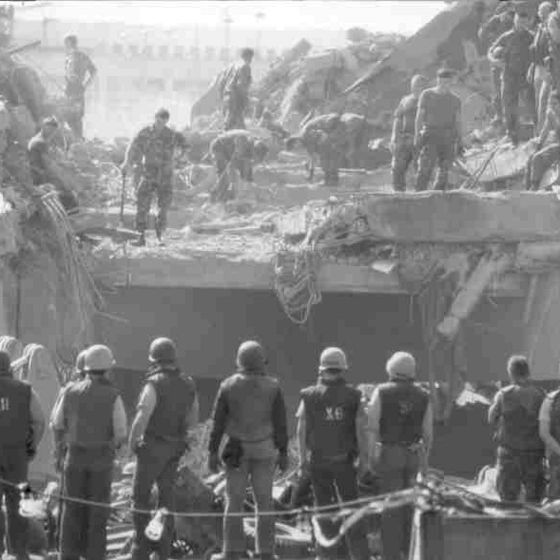
Roule criticized the US sanctions systems on Iranian officials as inconsequential since almost all of the sanctioned individuals would never seek to come to the US or own property there in the first place. He explained that not only such actions are symbolic but also encourage the adversary to say that “this is all they’re going to do.” “From Ukraine to Gaza; from Washington to New York; from Beirut to Yemen and Africa people are dying and will die unless this posture changes.”
Calling on the US as well as its European and Asian allies to confront Iran, Roule said that if the international community is not willing to confront Iran at present, “would they be willing to confront Iran with a nuclear weapon?” “Relentless diplomacy is a brilliant approach but endless diplomacy without deterrence is a gift to Tehran,” he stated.
He also slammed the lax enforcement of oil sanctions that have made Iran built up its foreign currency reserves “that would be very difficult and time consuming to gnaw down under actual serious sanctions.”
Jason Brodsky, the UANI policy director with deep insight into Iranian politics, pointed out that the Biden administration seeks to keep Iran's role in the Hamas attack “undefined” because saying that Iran was directly involved puts public pressure on the administration to do something about it. “It's apparent not only to Americans but to the Iranian regime that he is not keen on doing something about the Iranian problem.”
He noted that unless Iran believes that the US is willing to inflict grievous military losses on it, “the escalation is inevitable.”
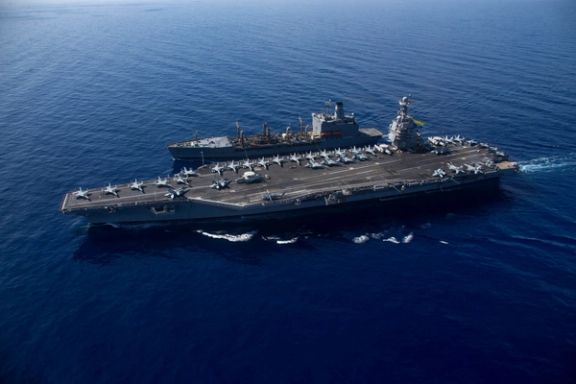
“We can't just create deterrence by issuing a strongly worded press statement, warning of unspecified consequences... we can't restore deterrence with piecemeal sanctions on individuals who have no assets in the United States and are unlikely to travel here,” he said, stating that “there has to be a kinetic element to these policies to change the Iranian perception.”
Kasra Aarabi, a UK-based IRGC specialist, referred to remarks by British officials who labeled Iran’s Revolutionary Guards as the biggest threat on the UK soil, saying that there are mountains of evidence to prove that Revolutionary Guards are active on British soil. He explained how groups linked to Iran’s Supreme Leader are influencing the minds of British Muslim students with antisemitic and extremist ideologies, hosting events with IRGC commanders as speakers who “glorify IRGC terrorism.”
“They called on these students in London to join an apocalyptic Army to ‘end the lives of Jews’ around the world,” he underlined.
Urging the designation of IRGC as a terrorist group to limit their sway, Aarabi said that “despite the IRGC's persistent efforts not only to target British citizens directly but also to nurture homegrown Islamist radicalization and terrorism using methods like ISIS and Al-Qaeda through their centers... the IRGC is still not being proscribed.” “That’s the least Europeans can do.”
He emphasized that targeting IRGC bases in the region and inside Iran is not targeting the Iranian people, but “the very people who terrorize the people of Iran, the very people who killed Mahsa and Nika,” some of the most iconic martyrs of the boldest uprising against the clerical regime, came to be known as the Women, Life, Freedom movement.
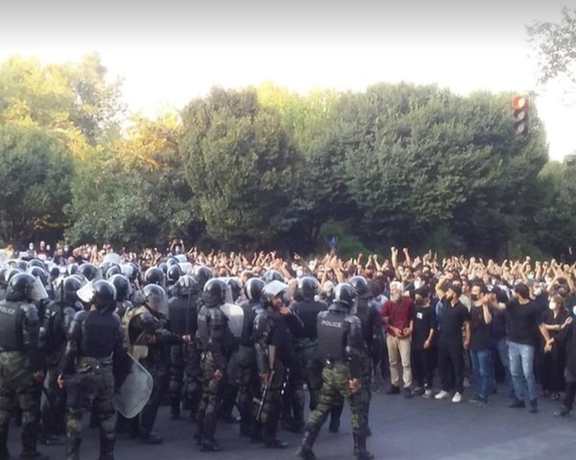
“Iranian people share a common enemy with the Israeli people; the Iranian people stand with the Israeli people because the force that is terrorizing the people of Israel is the same force that is terrorizing the people of Iran,” he argued.
Gabriel Noronha, a former special advisor for the Iran Action Group at the US Department of State, mentioned several incidents that happened exactly as were predicted. He said, Senator Graham warned that if we withdrew from Afghanistan, the Taliban would take over and they did; Senator Graham warned that if we didn't provide weapons to Ukraine and that if we didn't sanction [Russian gas pipeline network] Nord Stream 2, Russia would invade, and they did; Senator Graham is warning now that because we refused to enforce sanctions on Iran, we are headed towards a disaster.”
He said Iran was giving Hamas $100 million a year in 2017 and with the Trump administration's maximum pressure policy on Iran, the Islamist group had to adopt austerity measures, but today “Hamas is getting $350 million from Iran that is 93 percent of its budget.” The Hamas attack on Israel “has been a wakeup call.”
Referring to Iran’s assassination threats against former Secretary of State Mike Pompeo and former National Security Advisor John Bolton as well as the kidnapping attempt against human rights activist Masih Alinejad, Noronha said that “we cannot let the smoking gun be a dead senior American official or human rights dissident.”
Claiming that Iran earns over $150 million a day in oil income, he said the solution is to enforce sanctions to decrease the revenues “as close to zero as we possibly can that will dry up the money for terrorism.” He said when the oil sanctions were being enforced in 2019, Iran’s oil output had dwindled to about 300,000 to 400,000 barrels per day, forcing Iran’s militia groups to lay off fighters because they could not afford to pay them. Now, the regime’s oil exports are estimated to be nearly 2 million barrels.
“We have to tell Iran if you kill Americans, there are consequences. Right now, Iran does not believe there are consequences,” he said, adding, “There have been no missiles from the United States against Hamas; There have been no US missiles against the Iranian installations that fund and train Hamas fighters and there have been no attacks against Iran's oil infrastructure which funds all these attacks.”
“If we continue the status quo, things will get worse,” he noted, calling on Republicans and Democrats to work together and create firm accountability for Iran, which means Congress should authorize the President to take action and that requires Congress to pass laws.
He highlighted that the Iranian people want to overthrow the regime, saying that the US should “put pressure on the regime and the Iranian people will do the rest.”
UANI CEO Wallace said the US has no longer a doctrine of preemption but a doctrine according to which a large number of people should be sacrificed before Washington takes serious actions. “How many rockets must rain down on Israel before we act?” he asked.
“The doctrine of preemption is already over because they've already attacked. This attack by Hamas was already that Iranian attack,” Wallace noted.